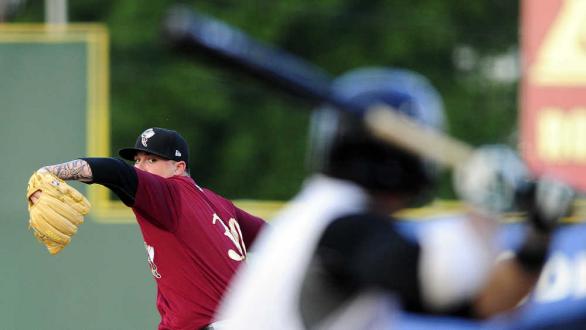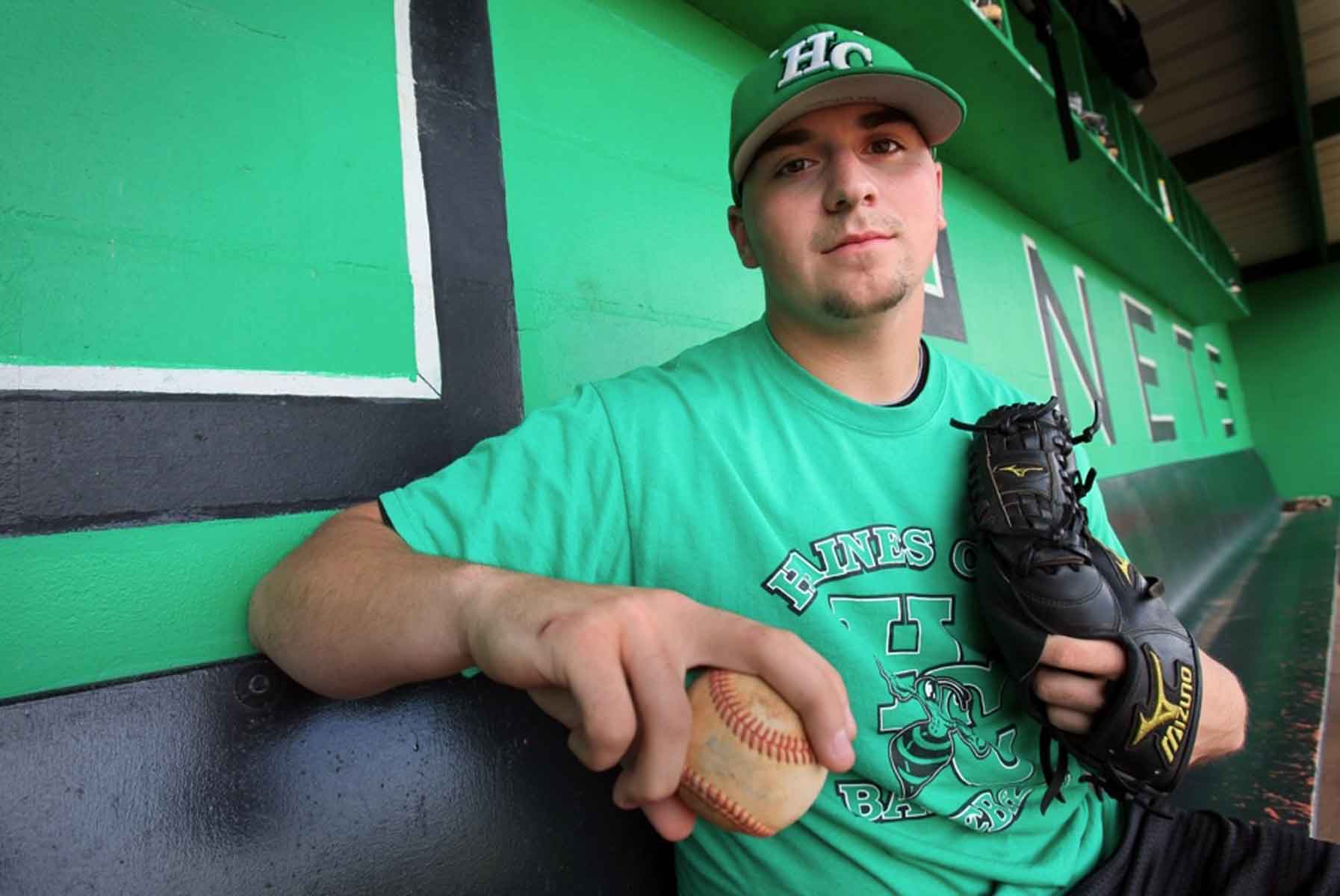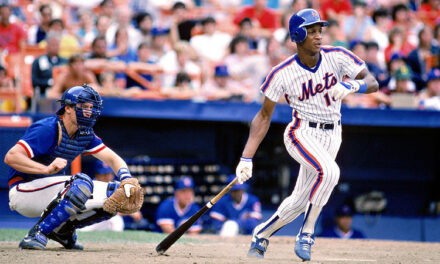
It’s been quite the journey for Mets’ right-hander Rob Whalen.
Growing up a Mets fan living in the Poconos, Whalen relocated to Florida when he was a teenager with his family so he could play baseball more frequently. Everything culminated when he was selected by the Mets in the 2012 draft. Whalen chose to forego college to sign with his childhood team.
After pitching in the Mets system for a couple seasons, Whalen was traded to the Atlanta Braves along with fellow pitcher John Gant close to the 2015 trade deadline for Kelly Johnson and Juan Uribe.
In 2016, Whalen was named Pitcher of the Year by the Braves Double-A affiliate the Mississippi Braves, and debuted in the majors that season, starting five games with the big club. However, that offseason, he was shipped off to the Seattle Mariners in a trade that brought the Braves reliever Alex Jackson.
Whalen had brief stints with the Mariners in 2017-18, but decided to hang up his cleats in February, 2019, due to his struggles with depression and anxiety.
Over the last year, Whalen worked on getting to the root of his anxiety, and spent the time working on himself and getting back to feeling like Rob Whalen again. When he was able to have more good days than bad, his drive to play baseball returned.
The 26-year-old started utilizing the FLATGROUND app and posted videos of himself on Twitter to show he was healthy and was looking to attract the interest of a MLB team. Whalen was still under contract with Seattle when he decided to return to the game, but was granted his unconditional release, and called up the Mets to see if they would watch him throw.
The Mets liked what they saw and they signed Whalen earlier this week to a MiLB deal with an invite to Spring Training.
I caught up with Whalen, where we talked about him growing up a Mets fan, his battle with anxiety and depression, how he has persevered and his new chapter with the Mets.

Piersall: Tell me about your beginnings in baseball. You’re from Queens, New York but located to Florida where you could play baseball more frequently. Was ultimately making professional ball your main goal growing up?
Whalen: My parents were born and raised in Queens, and my sisters were born in New York as well, but I’m the only one in my family who was actually born in Pennsylvania. We grew up in the Poconos, but my dad commuted to New York City for work. He was a UPS driver in Manhattan for a very long time. After making the 14u USA Baseball team, we moved to Florida in 2008 for my freshman year of high school so I could play more year round and face better competition as often as possible. I was a Mets fan growing up, and used to go to games all the time and just knew that one day I wanted to be a Major League Baseball player, but more specifically a New York Met. That was the dream.
Piersall: What was it like being selected by the Mets in the 2012 draft? Was being selected by the Mets a factor in foregoing college?
Whalen: It was a surreal moment. I couldn’t have written it to happen any better. Obviously I would’ve been ecstatic to play for any organization, but deep down being a Met was a preference. It definitely made the decision to sign instead of going to Florida Atlantic University that much easier. I just wanted to get my foot in the door and start my professional career.
Piersall: What were the emotions like being traded to the Atlanta Braves during the 2015 season? As only a 21-year-old at the time, was that a difficult transition to make or deal with?
Whalen: It was a bittersweet moment. I didn’t see the trade coming and I didn’t want to leave the Mets. I was having a pretty solid start to my career with New York, and I was in High-A at the time so I felt like I was on the right path to making my dreams of being a New York Met in the big leagues a reality. Despite all that, I was excited for a new opportunity and was happy that another team valued me enough to bring me aboard.
Piersall: Roughly a year ago, you announced your retirement from professional baseball due to your battle with anxiety and depression. Can you take me through that a bit?
Whalen: It was one of the hardest decisions I ever made. I was risking it all by walking away, but it was something I had to do and I’m glad I did. I was just in a really bad place mentally and emotionally and needed the time away to get everything under control. Trying to play at a high level and be on the road grinding everyday wasn’t the best environment for me to deal with what I was going through. I needed to take the time to dedicate myself to getting healthy and regaining control in my life.
Piersall: Over the last year, have you worked on anything specific that has led you to wanting to pick the ball back up and start playing again?
Whalen: I wouldn’t say there was any one thing that I worked on as much as it was a collection of variables that needed to be addressed on a personal level. I was able to get to the root of what was triggering my anxiety and how I could attack it head on. Over the course of the year, I found myself having less and less bad days and felt like I was becoming myself again and really missed competing deep down. I started working out again and focusing on pitching and before you know it, I was excited to get up everyday to train and throw. That was something I was missing for a long time.

Piersall: How has a year away from baseball helped you?
Whalen: I think it has helped me greatly. Rob Whalen the 25-year-old was lost and defeated, but so much has changed since the day I announced my retirement. I’ve been able to learn a lot about myself and how important it is to have a strong foundation in your personal life. Baseball is my career but I was living and dying with every outing for the last three years. It was how I was identifying myself. It wasn’t a healthy way to live but, not anymore. I know who I am, I’m confident that I can handle anything that’s thrown at me now. if I can survive all this, I have nothing left to be afraid of and that brings me confidence and peace.
Piersall: What would your advice be for a minor league player right now that is battling depression/anxiety and has thought about walking away from the game?
Whalen: The biggest piece of advice I can give is to just find someone you’re comfortable talking to and sharing what you’re feeling and going through. It might sound super cliche and basic, but that was a huge help for me. Saying the words out loud, speaking the thoughts I was having out loud. By doing that, I was able to identify specific triggers of my anxiety and trained myself to react to certain situations in a much healthier fashion. For a long time, I felt like I was the only one going through something like this, but I learned over time that I was completely wrong. I’m not alone and things do get better.
Piersall: In what way do you think MLB and MiLB can do a better job of helping players that deal with depression, anxiety, mental obstacles?
Whalen: It’s hard to say, because I think most teams do a very good job of addressing the fact that mental health is a huge issue and can not be overlooked, but I don’t know if we do a great job of treating the issues for players. I also understand that everyone is different and it’s not easy to combat everyone’s needs, but in a profession that keeps you away from your homes and families for up to 8-9 months out of the year, you would hope that teams would make their players feel their best interests are being looked after and that people have their back when real life issues come into play.
Piersall: Did the comfort of going back to the organization that drafted help ease your way back into the game?
Whalen: A thousand percent. Granted, when I decided to play again, I was still under contract with Seattle. I knew that Seattle wasn’t a great place for me and that if I was going to have a real shot and getting my career back on track, I was going to need a fresh start. Ideally, it would be with a team on the east coast, Triple-A in the International League, but I was in no position to be picky. Once I was granted my release from Seattle, the Mets were the first team I called. I was praying they would take a look at me and watch me throw. Thankfully, they gave me a chance and were pleased enough with what they saw to bring me back into the fold. I’m humbled by the opportunity and beyond excited to be a New York Met. It feels like home.
https://twitter.com/RobWhalen38/status/1220850563790843906
Piersall: I saw you had been working with former Mets scout Jon Updike and Top Level Athlete this winter. Can you take me through that? Was that something that helped you make a comeback to the Mets organization?
Whalen: I had been throwing bullpens and blasting out videos online via Twitter and Instagram for the FLATGROUND App. I knew a lot of scouts and teams would watch what was posted on there and it was going to help get my name back out there. Jon eventually private messaged me and was telling me about this facility he had players coming too, and offered to have me come out to throw some bullpens so I could get my metrics, and he was going to send that out with video to his contacts in hopes of helping me land a job somewhere.
The short amount of time I’ve gone over there has been a huge help, getting quality video, getting the analytical numbers and having someone like Jon and the other instructors over there at TLA breakdown everything for you really helped build my confidence back. Like “Hey, my stuff is still pretty good, I’m not that far off mechanically, I still got plenty left in the tank.” I’m very appreciative of Jon and the boys over at Top Level.
Piersall: The Mets recently tabbed Luis Rojas as their manager for the 2020 season. What experience do you have with Luis from working with him in the minors?
Whalen: I’m very excited for Luis, he was my skipper in Savannah (2014) and St. Lucie (2015). I always enjoyed my time playing for him, very laid back manager but commanded the room, soft spoken but got his message across. He believes in his players. He genuinely wants everyone to accomplish their dreams and goals. He always did his best to put his guys in positions to succeed. That’s all you can ask for as a player. I have a lot of respect of Luis Rojas and would be awesome to play for him again.
Piersall: Can you take me through your pitching style for the readers at home? Have you been working on anything different recently in regards to your mechanics or your repertoire?
Whalen: I am my best when I’m aggressive in the strike zone, letting my movement work. I throw in the low 90’s so I have to command the ball a little bit better than most nowadays. My sinker is my best pitch, my better games are when I’m attacking the bottom half of the zone and getting early ground balls. I’ve definitely worked on different things, but more so getting back to the things that made me successful in the first place. When I got to the bigs in 2016, I listened to way too many people and forgot what I did well, thinking it wasn’t going to work at this level. I added a little cutter to my mix to compliment my sinker as well as my breaking ball, a new gripped changeup that mimics my sinker, and really just having confidence in my abilities on the mound and knowing my stuff plays.
Piersall: Thank you so much, Rob, for taking the time out to talk to me!
Rob Whalen can be found on Twitter, @RobWhalen38.














